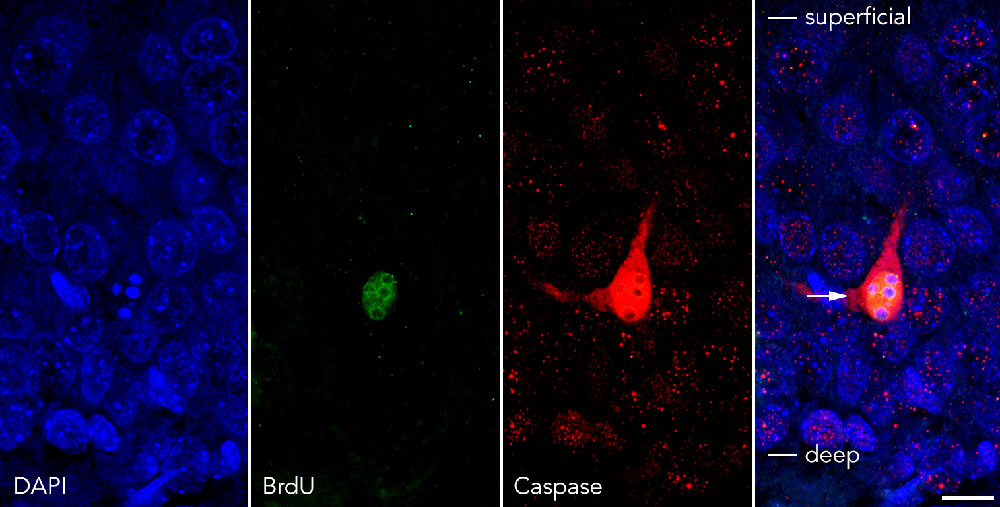
Pyknotic caspase3+ neuron that was born in postnatal day 6
Update: This work is now published in Hippocampus, here. The bioRxiv preprint is freely available and nearly identical in content.
The Snyder lab’s first paper now exists (pdf here, on bioRxiv). Well, it’s more of a manuscript. Or should I call it a preprint? Does it matter? The thing, as the title suggests, investigates the survival and maturation patterns of neurons born in the dentate gyrus subregion of the hippocampus (important for memory), specifically those neurons born in infancy. This is an exciting region of the brain to study because it produces neurons in adulthood. But perhaps because of this peculiar feature people have overlooked the neurons that are born in early development*. Anyway, the paper is not yet published in a peer-reviewed journal, which is why I hesitated to call it a “paper”. Except in the previous sentence I did actually call it a “paper”. Which I guess means that I don’t really care where it is published, so long as it is available for others to read. Probably the peer review process will enhance it a bit, but there’s no reason why you can’t read it as it currently stands and provide feedback, or peer review. In fact, it would be much better if many people gave feedback rather than the 2 or 3 that the journal recruits to review. Personally, my view is that the reader should always have a critical eye, and it is their job to decide for themselves whether they believe the results or have alternate interpretations, regardless of where the paper is published. And with that I invite your comments, thoughts, ideas etc. We can discuss, right here, anything and everything you have to offer, and any consultation will surely shape the final outcome of the final peer reviewed paper thingy.
Abstract: “The storage and persistence of memories depends on plasticity in the hippocampus. Adult neurogenesis produces new neurons that mature through critical periods for plasticity and cellular survival, which determine their contributions to learning and memory. However, most neurons are generated in early postnatal development; the maturational timecourse of these neurons is poorly understood compared to adult-born neurons, but is essential to identify how the dentate gyrus, as a whole, contributes to behavior. To characterize the survival and maturational timecourse of dentate gyrus neurons born in the early postnatal period, we labeled neurons born on postnatal day 6 (P6) with BrdU and quantified maturation and survival across early (1 hour to 8 weeks old) and late (2-6 months old) cell ages. We find that the dynamics of developmentally- born neuron survival is essentially the opposite what has been published for neurons born in adulthood: P6-born neurons did not go through a period of cell death during their immature stages (from 1-8w). In contrast, 17% of P6-born neurons died after reaching maturity, between 2-6 months of age. Delayed death was evident from the loss of BrdU+ cells as well as pyknotic caspase3+ neurons within the superficial granule cell layer. Patterns of DCX, NeuN and activity-dependent Fos expression indicate that developmentally-born neurons mature over several weeks and a sharp peak in zif268 expression at 2 weeks suggests that developmentally-born neurons mature faster than adult-born neurons (previously been shown to peak at 3 weeks). Collectively, our findings are relevant for understanding how developmentally-born dentate gyrus neurons contribute to memory and disorders throughout the lifespan. High levels of early survival and zif268 expression may promote learning, while also rendering neurons sensitive to insults at defined stages. Late neuronal death in young adulthood may result in the loss of hundreds of thousands of dentate gyrus neurons, which could impact memory persistence and contribute to hippocampal/dentate gyrus atrophy in disorders such as depression.”
Take home message:

Summary of our findings on the survival of neurons born in early development/infancy, compared with published data on neuronal survival.
A) Developmentally-born neurons survive early, immature stages of cellular development but many adult-born DG neurons die. B) Roughly 20% of developmentally-born neurons die after reaching maturing but adult-born neurons are relatively stable. *Asterisk indicates data from the current study, other data are from Snyder et al., (2009a), Dayer et al., (2003) and Kempermann et al., (2003).